When lawmakers returned from their summer recess this week, one of the first things they began work on was legislation to prevent another government shutdown. With the Oct. 1 start of the fiscal year, Congress has only a few weeks to pass a series of spending bills to keep the lights on.
How can that be when the president signed a sweeping two-year budget agreement at the beginning of August?
The agreement set broad guidelines increasing the amount of money the government can spend on defense and non-defense issues. Congress still needs to appropriate the money to various agencies.
To date, the House has passed nine spending bills this year, including money for the Defense Department. However, the Senate has delayed work on its spending bills, waiting instead for the August agreement to raise spending levels above previous budget caps. Absent a new budget deal, federal agencies would be subject to automatic budget cuts, known as sequestration.
[TAKE ACTION: Visit MOAA’s Legislative Action Center]
But with new top-line numbers in the budget agreements, lawmakers in each chamber must go back to the drawing board to rewrite the legislation to adhere to the new limits. Earlier this year, House lawmakers authorized $733 billion in defense spending. The Senate’s defense bill authorized $750 billion. In July, Congress voted on a bipartisan budget deal authorizing $738 billion.
The new budget numbers mean the House can authorize an additional $5 billion in spending, while the Senate must trim $12 billion from its bill.
Lawmakers are trying to decide how long the stopgap funding measure, known as a continuing resolution, will last. Optimists expect the extension to last until Nov. 22, although some members of Congress are floating the notion of a funding bill going until Dec. 6.
A continuing resolution delays aviators from flying hours, defers vital equipment maintenance, causes cancelations to training events and exercises, and places new acquisition and military construction programs on hold.
Even a short-term continuing resolution creates personnel turbulence.
It would be disappointing for Congress to disrupt the Pentagon with another budget Band-Aid. The August spending agreement was supposed to provide defense planners with much-needed budget certainty. A continuing resolution puts servicemembers in jeopardy.
Congress needs to set aside partisan differences and pass a defense appropriations bill before the start of the fiscal year.




